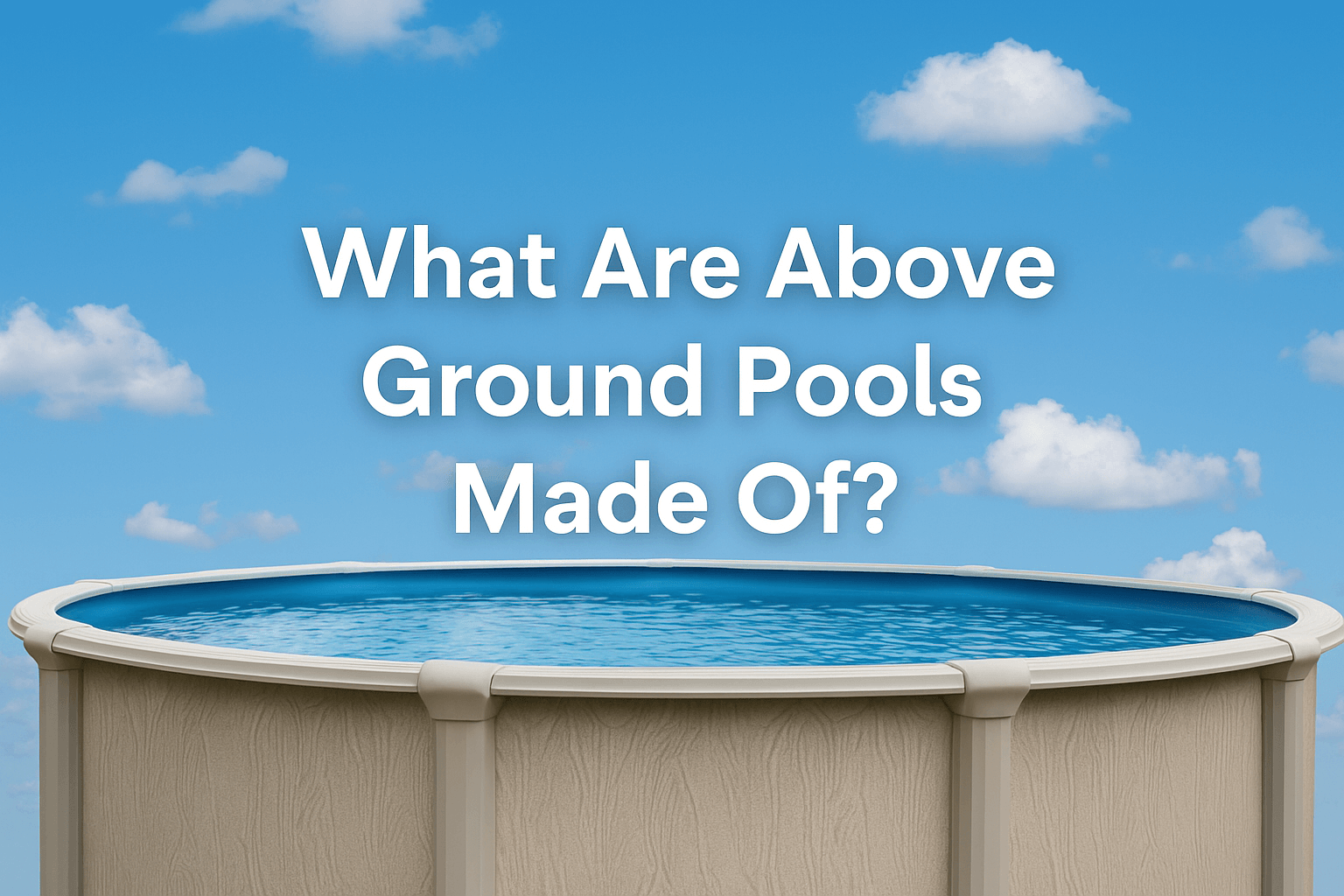
What Are Above Ground Pools Made Of?
Ever wondered what’s holding that splashy fun together in your garden? Above ground pools installed are made of steel, aluminium, resin—and a bit of summer magic. Each material affects strength, rust resistance, and style. Curious which suits your family best? Let’s dive into the frames, liners, and secrets behind installed pools.
Choosing the right above ground pool can feel like a mission. So many styles. So many materials. And if you're anything like most UK parents, you're looking for something that won’t fall apart after one summer and can survive a few cannonballs from the kids.
It helps to know what these pools are actually made of. Because what’s under the splash matters.
Primary Structural Components
The Pool Wall Material
Steel (Galvanised, Coated for Rust Resistance)
Steel walls are the heavy lifters of the pool world. Tough. Rigid. And built to handle wild UK weather. They’re often galvanised and coated to fight off rust, but if left uncared for, rust can creep in.
So, if you're after rock-solid strength and plan to keep the pool in one place long-term, steel might be your go-to. Just don’t forget to check the coatings regularly.
Resin (Corrosion-Proof, UV Resistant)
Resin walls are the sleek, modern choice. Think of them like the tech-savvy cousin of pool materials—smart, low-maintenance, and designed to last.
They handle coastal air and harsh sun like a pro. Unlike metal, they won’t corrode, making them a solid choice for families by the sea or anyone who wants a pool with less upkeep.
Aluminium (Lightweight, Rust-Resistant)
Need to move your pool now and again? Aluminium might be the one. It’s light, doesn’t rust easily, and is surprisingly strong for its weight.
It’s not quite as robust as steel, but for smaller gardens or temporary setups, aluminium keeps things simple—and dry.

The Pool Frame (Top Rails, Uprights, Bottom Track)
Steel, Resin, and Aluminium Combinations
Many pools now mix materials to get the best of all worlds. Steel for strength. Resin for rust resistance. Aluminium for easy handling.
These hybrid designs are clever. They blend durability with practicality, helping your pool stay stronger for longer.
Importance of Frame Strength and Durability
The frame is the unsung hero. It's what keeps your pool upright when the kids are bouncing off the sides or when the wind howls through.
Make sure it’s built to handle the rough and tumble of real life. A strong frame means less worry—and more time floating with a cold drink in hand.
The Essential Pool Liner
Vinyl Liner Material (PVC)
This is the bit you actually see and feel when you’re in the water. Vinyl liners are made from PVC, and they're the soft layer between you and the pool wall.
They're essential for keeping the water in—and keeping everyone comfy.
Types of Liners (Overlap, Beaded, Expandable)
There are a few types to choose from. Overlap liners hang over the wall and are secured with coping strips. Beaded liners snap into a track for a neater finish. Expandable liners? They stretch to fit deeper pools.
Pick based on the look you want and how deep you want to go.
Liner Thickness and Durability
Liner strength is measured in mils (not millimetres). Thicker liners—like 20 or 25 mil—last longer and resist punctures better. Especially handy if your dog thinks the pool is his new kingdom.
Here’s a quick guide:
| Liner Type | Thickness (mils) | Durability |
|---|---|---|
| Standard Vinyl | 20 | High |
| Overlay | 15 | Medium |
| Beaded | 25 | Very High |

Other Key Materials and Accessories
Filtration System Components
Pump Materials (Plastics, Metals)
Most pumps are made with tough plastic housing and metal internals. Why? Plastic holds up against pool chemicals, while metals inside give power and durability.
If you're running the pump daily, you'll want one that’s solid and won’t overheat.
Filter Media (Sand, Cartridge, DE)
There are three main filter types. Sand filters are low-maintenance and great for bigger pools. Cartridge filters offer finer filtration and are easy to replace. DE (diatomaceous earth) filters? Super fine and ultra-clean—but need a bit more care.
Each has its perks. Pick the one that matches your cleaning style.
Decking and Ladders
Materials for Pool Decks (Wood, Composite, Concrete)
Want to add a deck? Wood looks classic but needs regular care. Composite decking is low-maintenance and splinter-free—great for little feet. Concrete is solid and long-lasting but can be cold underfoot.
Choose based on budget, look, and how much time you want to spend maintaining it.
Ladder and Step Materials (Plastic, Stainless Steel)
Ladders are usually plastic or stainless steel. Plastic is affordable and doesn’t get hot in the sun. Stainless steel? Strong, stylish, and built to last—though it might need a quick polish now and then.
Safety first, though. Always choose a ladder with a sturdy grip.

Covers and Winterization Materials
Materials for Solar Covers, Winter Covers, Safety Covers
Solar covers are made from bubble wrap-like plastic to trap heat. Winter covers are heavy-duty tarps designed to survive the off-season. Safety covers use mesh or solid vinyl with reinforced edges.
Each one serves a different purpose. Don’t skip this step—it saves you cleaning headaches later.
Winterizing Plugs and Chemicals
To winterise, you’ll need durable rubber plugs for drains and jets, plus chemicals to balance the water.
A good winterising kit can make all the difference come spring. No one wants green soup when the covers come off.
Final Thoughts? Think of your pool like a car—it’s what’s under the bonnet that counts. Whether you’re leaning towards steel strength or resin ease, knowing your materials gives you a head start.
Choose well, look after it, and you’ll have a garden getaway that lasts for years.
Have you checked out our other posts?
Are Above Ground Pools Aluminium?
Are Above Ground Pools Fiberglass?
What Are Above Ground Pools Made Of?


Leave a comment